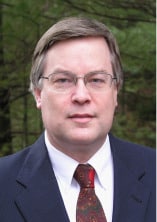Biography
Phillip M. Smith (S’81-M’82-SM’88-F’05-LF’21) received B.S., M.S. and Ph.D. degrees in electrical engineering from Cornell University, completing his studies in 1981. He then joined the GE Electronics Laboratory in Syracuse, New York, where he performed pioneering work on high-frequency transistors (primarily FETs and HEMTs) and associated monolithic and hybrid circuits, with emphasis on low noise and power amplifiers. In 1996 he was transferred to the Microelectronics Center in Nashua, New Hampshire as part of a Lockheed Martin III-V foundry consolidation, and this operation was later acquired by BAE Systems.
He has held a variety of positions, serving as Director of Microwave Devices & Circuits, with responsibility for devices, MMICs and modules, until 2008, and most recently as Chief Engineer of the Advanced Microwave Products Center, an organization with staffing of 250. His work has spanned the research, development and application of microwave devices and circuits based on GaAs, InP, GaN and Si material systems for a wide range of military, commercial and scientific uses at frequencies from 0.1 to 300 GHz. Honors include selection as a BAE Systems Global Engineering Fellow in 1996 and elevation to the grade of IEEE Fellow in 2005 for “contributions to microwave high electron mobility transistors.” He has authored or coauthored more than 180 publications and presentations (including more than 110 addressing low noise), and has been an active member of the IEEE, serving as member and past Chair of the MTT-S Microwave Low Noise Techniques Committee, as technical program committee member for conferences including IMS, IPRM and IEDM, and as a peer reviewer for several technical publications.
Presentations
A Survey of Microwave and Millimeter-Wave Low Noise Amplification Based on FETS And HEMTS
One of the most ubiquitous needs in systems today is the amplification of low-level signals without significant degradation due to noise. This presentation reviews the remarkable progress made over the past several decades in the evolution of transistors (specifically FETs and HEMTs) for low-noise amplifier applications, at frequencies from 1 GHz to 1THz, that include communications, radar, signal detection, remote sensing, radio astronomy and quantum computing. Devices employing material systems based on the semiconductors GaAs, InP, GaN and Si will be described, where content will include structures, physical/electrical characteristics and performance benchmarks. Various aspects of low noise amplifiers (LNAs) will also be discussed, including circuit design considerations, producibility, reliability, cryogenic operation, dynamic range, robustness and power consumption. Future trends will be forecast.
